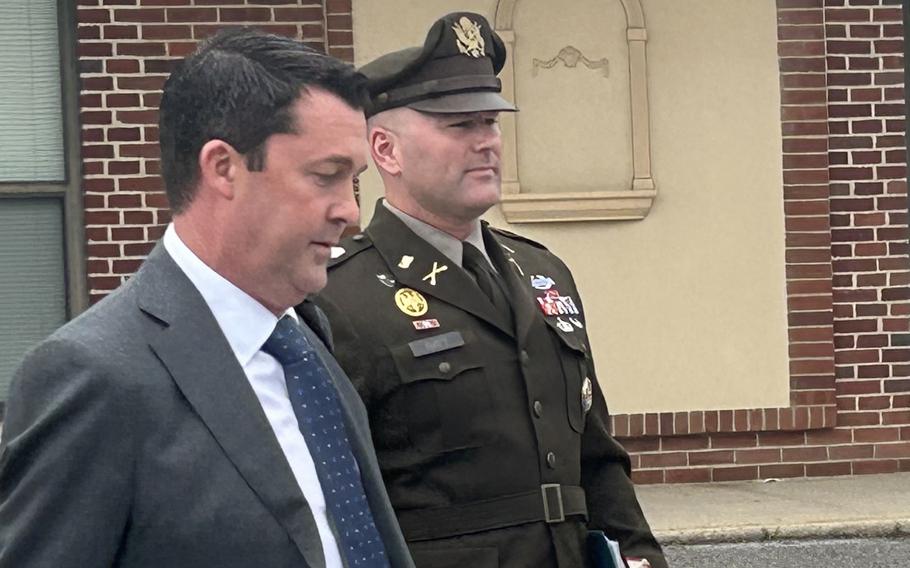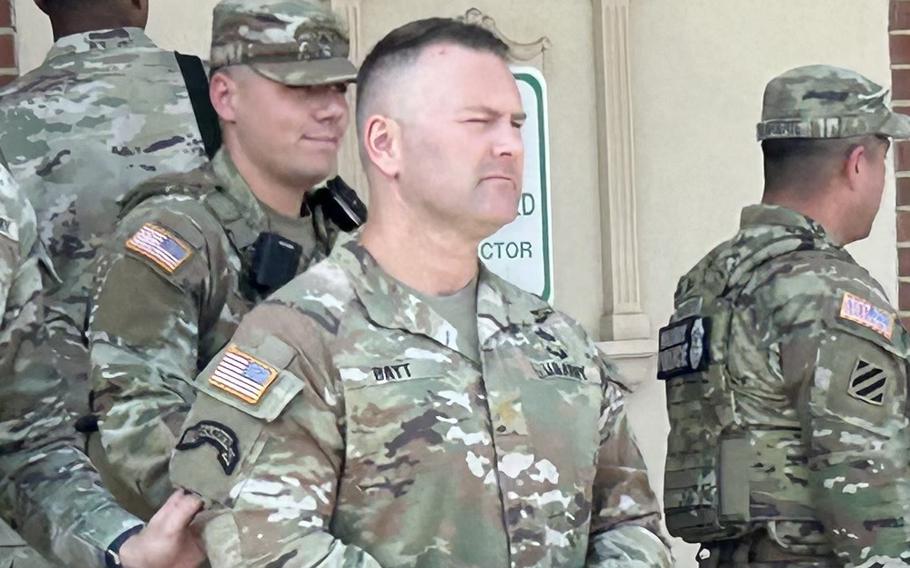
Army Maj. Jonathan Batt leaves the courthouse at Fort Meade, Maryland, with his legal team on June 17, 2025. (Tom Jackman/The Washington Post)
An Army Ranger who was arrested after a two-year investigation sparked by a Facebook group of women who said he sexually assaulted them was sentenced Tuesday to 53 years in prison after a military jury this week convicted him of two rape charges and more than a dozen other assault counts.
Maj. Jonathan Batt, 40, listened to 15 women testify against him during his three-week trial at Fort Meade in Maryland, then took the witness stand and provided detailed explanations for why, in his view, all the sexual encounters were consensual. “I am not a rapist,” Batt told the jury of three colonels and five lieutenant colonels, who heard closing arguments June 16, then deliberated for three days in the week since.
On Monday, the jury of six men and two women convicted Batt of 20 charges involving eight women, and acquitted him of 18 counts involving seven women. Each rape charge carried a maximum sentence of life without parole, and each sexual assault count had a 30-year maximum term. He was sentenced Tuesday by the military judge, Col. Adam S. Kazin, who presided at his trial.
“I am truly sorry for every hurt that I have put on to anyone,” Batt told the judge Tuesday. “And that is all I can say. I will grow and learn from this. I am sorry.”
In imposing the sentence, Kazin offered no explanation for how he determined what would be an appropriate prison term. He also ordered that Batt be “dismissed from the service.”
Batt’s attorneys and prosecutors had no immediate comment after the sentencing.
The jury foreman declined to comment after Monday’s verdicts. Batt chose to have Kazin sentence him rather than the jury. The judge heard victim impact testimony from several women on Tuesday who described the lasting impact that their violent encounters with Batt had on them.
“Jon Batt inflicted traumatic physical and emotional injuries I experience to this day,” said the woman whose Facebook post launched the investigation, “and likely will for a long time.”

Army Maj. Jonathan J. Batt leaves the courthouse at Fort Meade, Maryland, on June 23, 2025, after being convicted of rape and multiple sexual assault charge. (Tom Jackman/The Washington Post)
A soldier who testified that Batt impregnated her and forced her into having an abortion had to stop reading her statement when she became too emotional, and her Army victim advocate continued for her. “I am forever changed,” the soldier said. “I will never be the same. Nor will I ever look at the uniform the same.”
“This outcome would not have been possible without the bravery of the victims who came forward,” said Brian Porchia of Protect Our Defenders, which provided pro bono advocacy and legal support for the 14 civilian victims not aided by the Army. “That failure reflects a broader systemic issue: survivors were forced to rely on outside organizations when it should have been the Army’s responsibility.”
The total number of charges Batt faced was steadily reduced after he was initially arrested last October on 77 counts, including 14 rape and 16 aggravated assault charges. Prosecutors from the Army’s Office of Special Trial Counsel said five of the initial 20 accusers withdrew from the case, and a number of other charges were dismissed or combined with other counts.
In the end, the jury considered 38 total counts, including six rape, two aggravated assault by strangulation, 10 sexual assault and 16 assault and battery charges.
The jury convicted on two of the rape charges and reduced the four others to either aggravated assault or assault and battery. Batt was convicted of two aggravated assault and four sexual assault counts, seven assault and battery counts and one obstruction of justice count, for telling a woman not to cooperate with police. Prosecutors combined or dismissed four assault charges on Tuesday, leaving a total of 16 convictions.
Batt, a West Point graduate who then entered Ranger School, rose to major and was in line for a promotion to lieutenant colonel before his arrest. He had been assigned to an artificial intelligence division of the Army in Arlington, Virginia, where he also lived. He kept a boat on the Potomac, the “Batt Boat,” on which some of the incidents originated. He has a young daughter and testified he got married last month.
Prosecutors said Batt met the women through online dating apps, through friends or through work. All of the women agreed to dates, but many said they did not agree to sex, particularly on the first date.
From 2020 to 2023, “Major Batt preyed upon and attacked 15 different women when they were vulnerable, isolated and defenseless,” Army Lt. Col. Gregory A. Vetere said in his closing argument. He cited the testimony of a woman who had fended off one physical advance by Batt, told him she wasn’t interested in sex, then in a later encounter was forced to have sex at night on the Potomac River while they were on a Jet Ski.
Prosecutors also said Batt choked three women into unconsciousness during sex, without their consent. “They felt the life force being driven out of them,” Vetere said. “It is clear that the accused, in their testimony, was having sex with their unconscious bodies. That is rape, for which consent is not even a defense. An unconscious person cannot consent.”
Other women said they were tied with ropes against their will or forced to have sex after they said no. Two lawyers and an Army soldier were among the 15 women who testified against Batt.
Some of the women met after one of Batt’s girlfriends posted on the Facebook group, “Are We Dating the Same Guy?” Batt’s lawyer, Nathan Freeburg, said the subsequent discussions among the women constituted “witness contamination,” in which witnesses are exposed to prejudicial information before they testify.
Freeburg noted in his closing argument that Batt testified for nearly an entire day. “He looked you in the eye and told you the truth. We’ve done all an innocent person can do. We’ve shouted from the rooftops he is innocent.”
Freeburg pointed out that many of the women had subsequent encounters with Batt after claiming he sexually assaulted them. “I always have fun with you guys,” one woman texted Batt after engaging in a video-recorded threesome, Freeburg reminded the jury.
Another woman sent more than 100 messages to Batt after she was allegedly attacked. “That’s not someone who got assaulted,” Freeburg told the jury. “None of this makes sense.”
Batt maintained that nearly all of his actions were consensual and not unusual. “There’s always a conversation about what the other party wants,” he told the jury.
Prosecutors summoned an expert on how victims of violence respond to their attackers. She testified that many victims of interpersonal violence often maintain ties with their assailants. The jury was given instructions on multiple counts that evidence of sexual interactions with Batt “should be considered as to whether she [the accuser] consented to the charged act.”
The women in Batt’s trial gave varying explanations of why they continued to see Batt after he allegedly assaulted them. One of them, a lawyer, said she was shocked when Batt had sex with her after she specifically told him no, a warning Batt admitted to on the stand, and more shocked when he placed his hands around her neck, nearly rendering her unconscious.
But she said she discussed the choking with him and returned for a second encounter. She testified that the choking lasted longer the second time, but still she returned for a third time, with no choking, before ending the relationship.
“Just trying to give him the benefit of the doubt,” the woman testified. “He seemed like a nice guy.” The jury acquitted Batt of sexual assault but convicted him of aggravated assault by strangulation in the counts related to the woman.
The woman who first contacted police, in the summer of 2021, told a story even Freeburg acknowledged was “horrific,” of being partially bound, choked and raped after recently undergoing surgery as part of her transgender conversion. She said she had not told Batt that she was transgender.
But after undergoing a sexual assault exam at Inova Fairfax Medical Campus, meeting with a detective and starting therapy, she told police she didn’t want to prosecute Batt. She then saw him a second time and agreed to be bound again. She said she met with him to hear him apologize in person for their first encounter.
A year later, when the woman saw the Facebook group, she returned to the Alexandria police and said she wanted to prosecute. She had spoken to others who had posted in the group, some of whom then also cooperated with police and testified at the trial. The investigation restarted in August 2022 and was later joined by the Army Criminal Investigation Division, culminating in Batt’s arrest.
Batt was convicted of rape and assault and battery for his first interaction with the woman, and also rape of a second woman.
Though Freeburg claimed that the women’s interactions before trial constituted contamination, prosecutor Capt. Stephanie Ryder said eight of the 15 women who testified had never seen the Facebook group.
Ryder said three of the women testified that Batt had choked them into unconsciousness. Six women were bitten, struck or slapped by Batt, Ryder said.